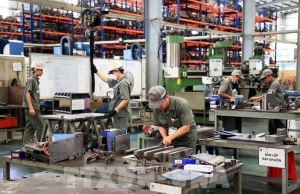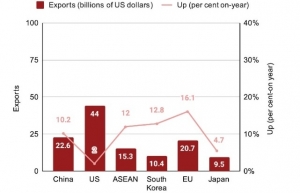Vietnam offering a land of promise for ASEAN investors
Reflecting on my five-year stay in Vietnam, which concluded in 2017, I recall significant multi-billion-dollar investments from Thai conglomerates during that time. Notable examples include ThaiBev’s acquisition of local beer company SABECO for $4.8 billion, Siam Cement’s expansion of their cement and building materials plant, Central Group’s acquisition of Big C’s operations, and CP Group’s plant expansions.
 |
| Aseem Goyal, managing director Factum Global Asia |
Post-global financial crisis, Thai businesses recognised that their domestic market had matured, prompting them to seek growth opportunities abroad. While Indonesia, the Philippines, and China also benefited from this outward expansion, Vietnam received the bulk of Thai investment.
Vietnam emerged as a favoured investment destination for several reasons. It has experienced consistent high economic growth rates, averaging around 6-7 per cent annually over the past decade. Vietnam’s strategic location and extensive network of free trade agreements, surpassing those of Thailand, have also attracted Thai companies.
Meanwhile, labour costs in Vietnam are relatively low compared to Thailand. Combined with high education levels and significant female workforce participation, it appeals particularly to manufacturing and industrial companies.
With a population nearing 100 million, a young demographic, and a rising middle class, Vietnam presents a lucrative consumer market. At the same time, the Vietnamese government has implemented various initiatives, including tax incentives, simplified administrative procedures, and the establishment of industrial parks and special economic zones, to attract foreign investment.
While Thai investors initially focused on retail and manufacturing, they are now venturing into other industries. Major Thai banks such as Bangkok Bank, Kasikorn Bank, and Siam Commercial Bank have operated in Vietnam for many years and are now expanding their operations in the country.
Similarly, the energy sector, particularly renewable energy, has seen growing interest from Thai investors. B. Grimm Power has invested in solar and wind energy projects, and PTT has explored opportunities in the petrochemical sector.
Other ASEAN countries, particularly Singapore, have also been major investors in Vietnam. In just the first four months of 2024, Singapore contributed $2.92 billion, accounting for nearly half of the total foreign direct investment during the period.
Singaporean investment is primarily focused on real estate and financial services. Major Singaporean banks like UOB, OCBC, and DBS operate there.
Similarly, real estate companies such as CapitaLand, Keppel Land, Mapletree Investments, Frasers Property, and Ascendas-Singbridge have some of the most high-profile projects in residential, commercial, and industrial real estate.
Malaysia is another ASEAN country whose investment has seen significant growth. Malaysian investment in Vietnam includes real estate, renewable energy, healthcare, and pharmaceuticals. Noteworthy projects include Berjaya’s $2.5 billion Vietnam International University project, which started construction in 2024, as well as Top Glove’s new glove factory in the southern province of Binh Duong.
Additionally, CIMB has expanded operations in Vietnam, partnering with South Korean fintech Toss, the country’s first unicorn.
ASEAN is a critical source of investment in Vietnam, with companies rapidly expanding their operations there.
Their focus and success can be attributed to three main factors: ASEAN investors appreciate that returns will take time and that they are in the country for the long term; having navigated their local market’s regulatory complexities, ASEAN investors are better prepared to handle Vietnam’s business environment; and with a focus on ASEAN economic integration and limited opportunities in their own markets, investing in Vietnam makes strategic sense.
The increasing Thai and ASEAN investment in Vietnam signifies a robust economic partnership. Driven by Vietnam’s economic growth, strategic location, cost-effective production environment, and supportive government policies, ASEAN companies are strategically positioning themselves in key sectors.
As Vietnam continues to grow and integrate into the global economy, this trend is likely to accelerate, bringing mutual benefits and strengthening economic ties. This relationship enhances economic cooperation and fosters closer regional integration within ASEAN, contributing to the region’s stability and prosperity.
 | Enticing FDI legal framework for dual transformation Vietnam is preparing for future foreign direct investment (FDI) shifts to ensure funding reaches the right areas and embraces green and digital goals. |
 | FDI attraction in five months tops 11 billion USD More than 11.07 billion USD in foreign direct investment (FDI) was funneled into Vietnam during January-May, up 2 per cent against the same time last year, according to the Ministry of Industry and Trade (MoIT)’s Foreign Investment Agency. |
 | FDI to be expanded with green focus Vietnam is projected to improve its trade and investment flows as global demands increase, with a green trend on the rise in supply chains. |
 | China leads number of newly-registered projects in Vietnam While Singapore is the leader in terms of foreign investment value, China is ahead in terms of number of new projects in Vietnam. |
What the stars mean:
★ Poor ★ ★ Promising ★★★ Good ★★★★ Very good ★★★★★ Exceptional
Related Contents
Latest News
More News
- MAE names big 10 policy wins in 2025 (February 06, 2026 | 08:00)
- US firms deepen energy engagement with Vietnam (February 05, 2026 | 17:23)
- Vietnam records solid FDI performance in January (February 05, 2026 | 17:11)
- Site clearance work launched for Dung Quat refinery upgrade (February 04, 2026 | 18:06)
- Masan High-Tech Materials reports profit: a view from Nui Phao mine (February 04, 2026 | 16:13)
- Hermes joins Long Thanh cargo terminal development (February 04, 2026 | 15:59)
- SCG enhances production and distribution in Vietnam (February 04, 2026 | 08:00)
- UNIVACCO strengthens Asia expansion with Vietnam facility (February 03, 2026 | 08:00)
- Cai Mep Ha Port project wins approval with $1.95bn investment (February 02, 2026 | 16:17)
- Repositioning Vietnam in Asia’s manufacturing race (February 02, 2026 | 16:00)

 Tag:
Tag:




















 Mobile Version
Mobile Version